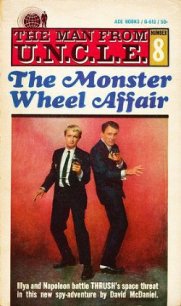The Rainbow Affair - McDaniel David (книги хорошем качестве бесплатно без регистрации .txt) 📗
Napoleon made a quick knot to hold the sheet reefed, and clambered back to the inner cockpit where the internal guidance calculator continued its eerie green-lit gyrations. They were within two hundred yards of Rainbow's island headquarters!
He spun back to the stern and shouted, "Illya! Stand by to come about! Illya!" The Russian stirred numbly from his position at the tiller and nodded.
"Aye, aye. Ready to come about, sir," he said.
"Watch for my hand signal and swing the tiller towards the same direction as my hand points, about half way."
"Got it," said Illya as Solo scrambled back to his look out post.
Now he began to hear something else under the rain and the lonely hoot of the foghorn - a sea-bell, rocked and rung by the leaping waves at the shore of the island. And then, as they swerved to approach directly, he could hear the hiss of gravel as it was sucked and rolled by the roots of the waves that passed over, and he knew they were very close.
Suddenly a sheer wall of jagged rock loomed out of the night, towering into the darkness beyond their feeble running lights. The bell rang clearly to their right, and Napoleon thrust the rock away with his spar.
They were half in the lee of the island now - the back eddies of the storm pushed them fitfully from side to side, but the force of it was cut. With Illya quick on the rudder, and Napoleon switching the jib from side to side as the rough gusts shifted, they beat along not forty feet from the face of a rugged cliff, as the bell grew louder ahead.
At last, dim against the rain-glittering darkness, they could see a tiny floating dock, at the foot of a wooden staircase that staggered up the face of the cliff and out of sight. They steered in as close as possible, and Napoleon, rope around his waist, poised on the rail, holding onto a brace with one hand, gauged the rise and fall of the dock and the boat, waited, watched, and finally leaped.
The ship lurched towards the shore as he jumped, giving an extra impetus which may have saved him. He landed on hands and knees on the pitching surface of the little square dock, and clutched at an upright to save himself from being pulled away. As the pull slacked off, he hauled in the rope and got an end of it around the same upright with two turns before the waves forced them apart again. This time the boat was held near, and he hauled in more line. When the prow was held securely to the dock and only the stern swung free, he tied it down solidly and ran aft, where Illya threw him the stern line.
The procedure was repeated in a matter of moments, since half the weight of the boat was already anchored, and Illya leaped to the dock, an oilcloth bundle under his arm.
Together they fought their way up the water-slick wood of the narrow stairs. Unwilling to surrender them, the storm seemed to increase in fury, trying to pull them from their perch and carry them away. They climbed, back and forth; twenty steps and a landing - turn around - twenty steps and a landing. The sound of the sea fell away beneath them as they climbed, and the storm came at them from below as well. The dock was now lost to sight, and nothing showed above them yet. Each had a waterproof electric torch, which served no more than to show them where the steps were before them. Their beams were swallowed up by the night less than twenty feet away.
Then there were no more steps, and the top of the rock, rainlashed and windswept, spread before them. Forty feet away across an artificial-looking flat smooth area stood the darkened lighthouse, tall and white, gaunt and forbiddingly lonely in the stormy night. No lights showed anywhere. The foghorn bellowed and died again.
Both paused at the top of the stairs and looked at their goal.
Illya caught up to Napoleon and said, "Well, there it is. Shall we just go try the door?"
"Why not? It has to be the right place."
"There's no place like it anywhere near here," said Illya. "Come on. Let's get out of the rain."
They hurried across the open field towards the tower, their lights extinguished. A quick search around the base found a door—the only opening apparent at ground level. Huddling over the handle, lights dimmed by fingers over the lenses, they tested the handle. It turned, and the door gave slightly inwards. No light showed around the frame.
Illya looked up doubtfully, and Napoleon shrugged. "Who would bother to lock a door on an island as well guarded as this? Remember the same situation on Dauringa Island?"
The Russian agent nodded, and pushed the door open, to dart the attenuated beam of his torch into the room.
It was empty. They ducked inside quickly and closed the door behind them.
In the relative silence, they looked around. There was a desk in one corner, and two doors opening in different directions. The one on the right ahead of them showed a light, and led down. The one on the left side bore a sign saying, COMMUNICATIONS. KEEP OUT.
Napoleon smiled. "I knew," he said, "we would find a Rainbow at the end of the storm."
Section IV : "The Rainbow Comes and Goes"
Chapter 13
How A Lighthouse Proved Larger Within Than Without, and Napoleon and Illya Became Unexpected Guests.
THEY HAD ENTERED the lighthouse on the ground floor, and had more or less expected to be at the bottom. But the relative sizes of the doors leading up and down indicated that the far greater portion of traffic went down into the rock. They passed the desk and looked through the glass doors.
"It's Dauringa Island all over again, isn't it?" said Napoleon in a whisper. "Only the stairs go down."
"And shall we?"
"Why not?" After checking the edges of the door for concealed alarm switches and concealing their outer garments in a cupboard, they passed through the double doors into a rough-hewn rock stairwell leading down to a landing and switching back.
"I wonder how far down it goes," Illya murmured.
"Considering its proprietor, the other end probably comes up in the Royal Mint."
They descended past a door on the next level down, and stopped at the second. "How interested are you in getting all the way to the bottom of this?"
"Not especially. Besides, we'd have to climb all the way back up. Let's look in here."
"My idea precisely." They leaned on the push-bar and the door swung open, revealing a narrow corridor some fifty feet long. Flat-painted plywood partitions formed walls, and fluorescent lighting fixtures hung from the rocky ceiling. One light in ten was still on, splashing shadowed blue-white light over the offices and into the corridor. At the far end, under what might have been the generator house attached to the light upstairs, an open door with a heavy bar across it let into an unlit space. They walked, rubber-sole silent, down the hall towards it.
Name tags were slipped into slots on the doors as they passed - normal names with nothing in common to show why they would appear inside an artificial cave under a lighthouse in the Bristol Channel. It was uncanny. Napoleon suddenly had the impression that the western branch of the London Underground terminated two floors below them, and that these offices were daily filled with ordinary commuters. He shook his head to clear it, and looked down at the room beyond the open doorway.
It was an empty shaft, faced on the inside with well-finished cement, apparently awaiting an elevator. Light shone against the far side of the shaft many feet below them, indicating the next level down.
Napoleon stepped back from the edge. "If it's all the same to you," he murmured, 'I'll walk down."




